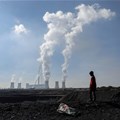The African energy sector witnessed several milestones at the 2023 edition of Africa Oil Week (AOW) that was themed Investing in African Energy. From the continent setting its own pace for the energy transition, to boosting exploration activities and regional cooperation, African nations and stakeholders showcased their commitment and potential to the global energy community.
“Africa must keep the lights on during its transition period,” said South African deputy president Paul Mashatile during a passionate opening ceremony on Tuesday. He echoed calls from governments and stakeholders to set pragmatic, realistic targets for Africa’s transition, while prioritising the continent’s development needs.
He also called for enhanced collaboration among African countries to increase cross-border energy trade and investment.
One of the main outcomes of the event was the consensus reached by AOW and the Green Energy Africa Summit (GEAS) - which happened concurrently at the Cape Town International Convention Centre - that Africa will determine its own timelines for achieving a low-carbon future, while balancing its development needs.
Unlocking Africa's energy economy
There was a confirmation and consensus that Africa's rig count is at its highest level in years, reflecting a recovery in the exploration market. The continent has seen a series of significant discoveries in the Orange Basin, Nigeria and Mozambique, among others.
AOW 2023 conversations also revealed details of ongoing drilling programmes in Zimbabwe and Mauritania, two emerging exploration hotspots. In particular, Zimbabwe's natural gas exploration is projected to have a transformative impact on Southern Africa's energy security.
Rachel Savage and Jorgelina do Rosario 16 Oct 2023 Azule Energy also announced plans to drill Angola's first gas exploration well in 2024, on Block 1/14.
The conference became a crucial setting for dialogue, creating a platform to promote attractive open blocks and licensing rounds in Africa, and have critical discussions and negotiations around opportunities in Angola, Namibia, Gabon, Congo, The Gambia, Sierra Leone, and Tanzania.
The gas agenda
Liquid natural gas (LNG) emerged as a key theme as experts and officials highlighted its role as both a transition and destination fuel for the continent.
Several projects were showcased, such as the GTA LNG hub in Mauritania and Senegal, the Congo LNG project in Congo-Brazzaville, the Coral Sul and Coral North FLNG units in Mozambique, Tanzania LNG, and Nigeria LNG's potential expansion.
Attendees also explored the opportunities and challenges for regional gas trade, especially in West, Central, and Southern Africa, where the demand for gas is growing rapidly. However, speakers also stressed the need for more favourable policies and regulations to attract investment and increase gas production.
Nigeria, Africa's largest oil producer, also made a strong impression at the conference, after implementing swift reforms under its new president Bola Tinubu. Olu Verheijen, special advisor to President Tinubu on energy, told the audience that Nigeria was open for business and would not sacrifice its development goals for emission reduction.
The country showcased several deals involving gas monetisation, industrial park development, refinery expansion, and farm-in opportunities across onshore and shallow-water areas.
Decarbonise at a cost
The challenges of financing and decarbonising Africa's oil-and-gas sector were the main topics of discussion at the Finance and M&A Forum that brought together representatives from development-finance institutions, commercial banks, private-equity investors, and oil-and-gas companies operating in the continent.
A consensus was that access to capital will require more creativity and innovation, especially in unlocking domestic sources of funding and developing dual-currency financing mechanisms. The conference also recognised the need to make Africa more globally competitive and attractive for investments, while developing its natural resources in a sustainable manner.
One of the key aspects of sustainability is the decarbonisation of the oil-and-gas sector. Panellists highlighted the opportunities and challenges of adopting lower-carbon technologies and carbon-capture, utilisation, and storage projects in Africa. They also suggested some quick wins for reducing emissions in the upstream sector, such as utilising associated gas and optimising value chains.
AOW provided a platform for stakeholders to share insights, best practices, and solutions for financing and decarbonising Africa's oil-and-gas sector, as well as to explore new partnerships and deals.










































